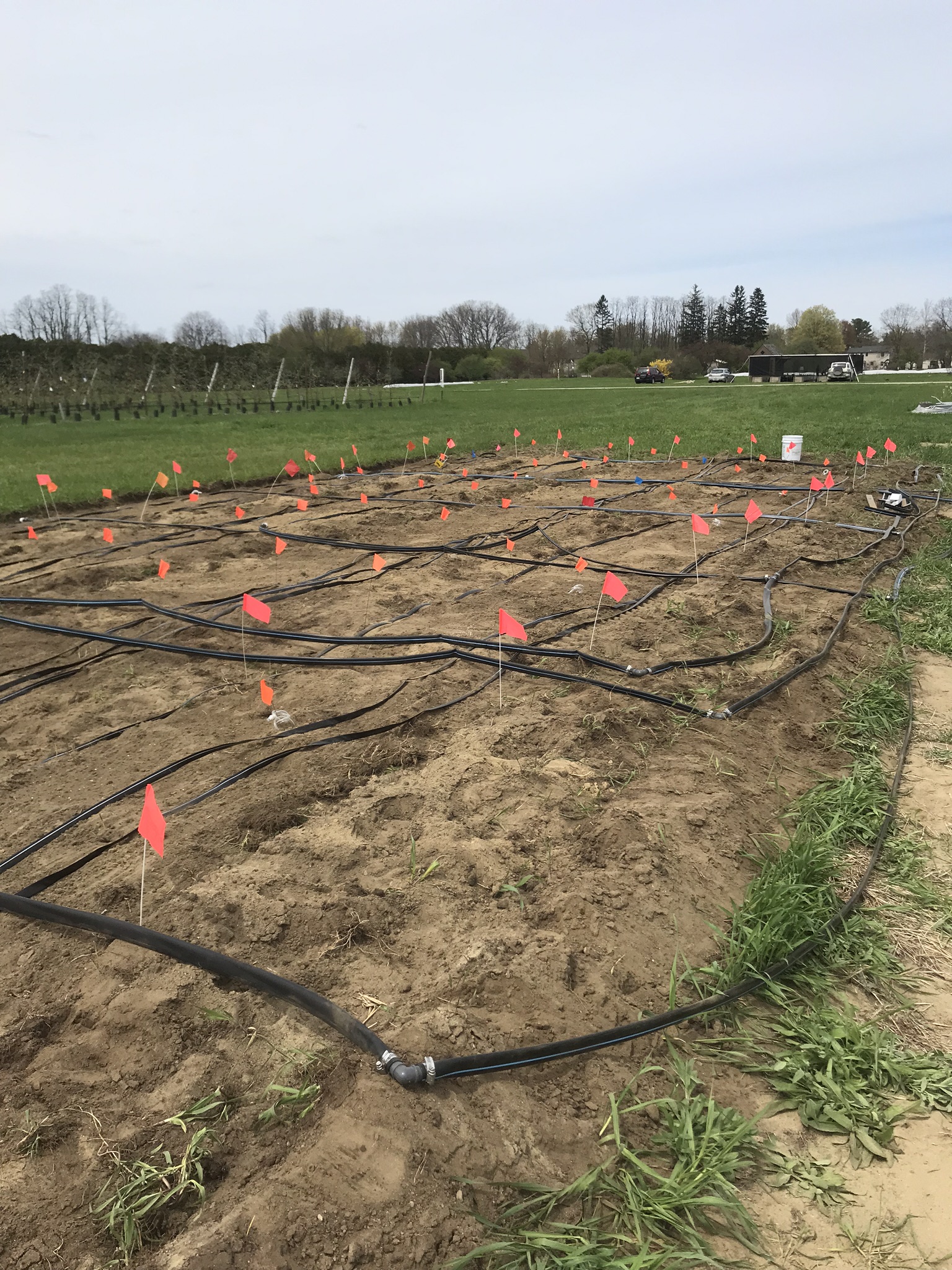Manuscripts
PFAS contamination and agroecosystems
The widespread presence of per- and polyfluoroalkyl substances (PFAS) is a source of ecological disturbance, economic loss and emotional hardship within agricultural ecosystems. Our group is exploring soil x plant and plant x plant interactions with a focus on the uptake of PFAS into crops, and how contamination may be mitigated by farm management practices. We are conducting a paired greenhouse and field experiment through which we aim to: (a) Compare and contrast greenhouse vs. field approaches in PFAS research; (b) investigate soil-to-plant PFAS transfer among crops with distinguished physiologies; and (c) examine impacts of interspecific plant interactions on contaminant uptake in PFAS-disturbed soils as they relate to management practices and farm viability.
Collaborators: Alexandra Scearce (UMaine), Rachel Schattman (UMaine), Caleb Goossen (MOFGA), Jean MacRae (UMaine), Yong-Jiang Zhang (UMaine), Ling Li (UMaine), Ellen Mallory (UMaine)
Funding: The Maine Agriculture and Forestry Experiment Station (MAFES) through Hatch Project ME0-0223322, American Farmland Trust (AFT), the Maine Organic Farmers and Gardeners Association (MOFGA), and Maine Farmland Trust (MFT)
Photo by Adam Kuykendall (2021)
Manuscripts
The effects of changing precipitation on specialty crops in the Northeast
The Northeast, a historically a water-rich region, is forecasted to experience annual precipitation as a result of climate change. This increase will come with a change in the overall rainfall pattern of the region, as heavy rains are predicted to become more frequent, and droughts potentially more severe. Heavy rains can lead to saturated soils, which can disrupt normal plant function, increase the spread of disease, and lead to changes in field management. Droughts will likely threaten crop yield and quality, and change irrigation needs. Our team first studied this dynamic in strawberries (pictured at left), and are now conducting greenhouse trials with wild blueberries. In 2023, we will begin a new field trial as part of the Wyman’s Center for Wild Blueberry Research and Innovation, a partnership between Wyman’s and the University of Maine Agricultural and Forest Experiment Station (MAFES).
Collaborators: Ali Bello (UMaine), Bruce Hall (Wyman’s), Haley Jean (UMaine), Rachel Schattman (UMaine), Alicyn Smart (UMaine Extension), Yongjiang Zhang (UMaine), Sean Birkel (UMaine), Kallol Barai (UMaine), Seanna Annis (UMaine), Phil Fanning (UMaine), Diane Rowland (UMaine), Brian McGill (UMaine), Oluwafemi Alaba (UMaine)
Funding: Wyman’s, the Wild Blueberry Commission of Maine, the University of Maine Food and Agriculture Center (MFAC), MAFES (MEO #022332)
Manuscripts
Resources
Climate adaptation practices in agricultural advisor-farmer knowledge networks: Tracking the long-term impacts of the Northeast Climate Adaptation Fellowship
Climate change is requiring farmers and agricultural advisors alike to continuously adapt and learn. Professional development training aimed at this group can be delivered in a variety of ways, including programs that leverage peer-to-peer and community of practice approaches. This research aims to use one educational program, the 2021 Climate Adaptation Fellowship (CAF) Vegetable and Small Fruit program as a case study. The CAF group consisted of 37 advisor and farmer ‘Fellows’ from across the Northeast. The research will use surveys, interviews and farm visits to track how the program enabled changes for participants and use Social Network Analysis (SNA) to discover how information and advice related to climate adaptation flows and evolves through the social networks of these Fellows. The results will help to inform the design of climate adaptation extension and advisory services.
Collaborators: Sara Delaney Studer (UMaine), Rachel Schattman (UMaine), Erin Lane (USDA Northeast Climate Hub), Marjorie Kaplan (Rutgers Climate Change Insitute)
Funding: National Institute of Food and Agriculture, U.S. Department of Agriculture, through the Northeast Sustainable Agriculture Research and Education program under subaward numbers ENE20-164-34268 and GNE21-253-35383.
Credit: Tessa McGann
Manuscripts
Climate change perceptions and adaptation among foresters in the Northeast
Foresters in the Northeast are challenged to adapt their management to account for changing temperatures, precipitation regimes, and other related environmental factors. This research aims to assess how urban and rural foresters perceive climate risks and associated adaptive strategies, and what factors limit or facilitate their adaptation. Data will be gathered through interviews, surveys, and focus groups; findings will be used to inform concurrent field trials of adaptive forestry practices and to guide the focus of future research.
Collaborators: Tony D’Amato (UVM), Rachel Schattman (UMaine), Tessa McGann (UVM), Rachel Swanwick (UVM), Todd Ontl (Northern Institute of Applied Climate Science), Caitlin Littlefield (UVM), Jennifer Pontius (UVM and US Forest Service Northern Research Station), Paul Schaberg (USFS-NRS), and Gary Hawley (UVM)
Funding: “Adaptation and restoration of northern forests: Collaborative management of forests at risk across the urban to rural gradient” - USDA McIntire Stennis Forestry Research Program
Figure: Scott C. Merrill
Manuscripts
Awards: Non-monetary motivation for conservation behavior
In this study, we used a serious game approach to explore the effect of non-monetary conservation awards on participants’ agricultural management decisions in an online experiment. Our results show that study participants were highly motivated to implement cover crops on a year-by-year basis by the fictional Ecobadge award, particularly when award thresholds were set at low levels. This exploration suggests that non-monetary awards have high potential to serve as motivational tools to increase adoption of cover crops and potentially other agricultural conservation practices, likely as part of a suite of motivational strategies.
Collaborators: Rachel Schattman (UMaine), Scott Merrill (UVM), Eric Clark (UVM), Luke Trinity (University of Victoria)
Funding: USDA Northeast Climate Hub JVA#11242306-108, USDA NIFA AFRI #2017-68002-26728. and USDA National Institute of Food and Agriculture Hatch Project number ME0-1022424 through the Maine Agricultural & Forest Experiment Station.
Outreach, coaching, and payment for ecosystem services programs: Effects on soil health practices and regenerative agriculture in U.S. wheat systems
This project explores the role of privately-funded education and incentive programs, and the effects of these programs on farmer adoption of soil health and regenerative practices. Reduced tillage, cover cropping, livestock grazing cover crops, managed grazing, and diversified crop rotation all have the potential to benefit soil health, and provide ecosystem services both on and off the farm. In 2021, we will assess farmer perceptions of ecosystem service provision, as well as how these perceptions do or do not influence interest in payment for ecosystem service programs. The investigation includes a mail/internet survey of wheat farmers in Kansas and Oklahoma, in addition to a targeted series of interviews with farmers in the Cheney Watershed (Kansas). Our future findings will provide insights into farmer willingness to participate in novel ecosystem marketplaces, as well as the role of privately-supported outreach and education programs.
Collaborators: Rachel Schattman (University of Maine), Sara Kelemen (University of Maine), Andrea Basche (University of Nebraska Lincoln), Gabrielle Roesch-McNally (American Farmland Trust), Steve Rosenzweig (General Mills Inc)
Funding: General Mills Inc. Regenerative Agriculture Program
Manuscripts
Fact sheets
The effects of COVID-19 on food insecurity in Maine and Northern New England
University of Maine is a partner of the National Food Access and COVID Research Team (NFACT). Through this collaboration, we are engaged in rigorous, comparative, and timely food access research during the time of COVID. We do this through open access research to enhance our understanding of food system behaviors and policies. The Maine NFACT team has completed two surveys and is collaborating with partners in Vermont to conduct a series of interviews on how COVID-19 has affected food purchasing behavior, home food production (gardening, fishing, hunting, etc.), job disruptions, and dietary choices.
Collaborators: Rachel E. Schattman (UMaine), Kate Yerxa (UMaine Extension), Jonathan Malacarne (UMaine), Tara Whiton (UMaine Presque Isle), Meredith T. Niles (UVM), Emily Belarmino (UVM), Ashley McCarthy (UVM), Farryl Bertmann (UVM), Jennifer Laurent (UVM Medical Center), Scott Merrill (UVM), Sam Bliss (UVM), Zachary Kunicki (statistical consultant)
Funding: USDA NIFA Award #2021-10037, The University of Vermont Gund Institute for the Environment Joint Catalyst Program, the University of Maine School of Food and Agriculture, the University of Maine George J. Mitchell Center for Sustainability Solutions, and the University of Maine Agriculture and Forestry Experiment Station (MEO #022332).








